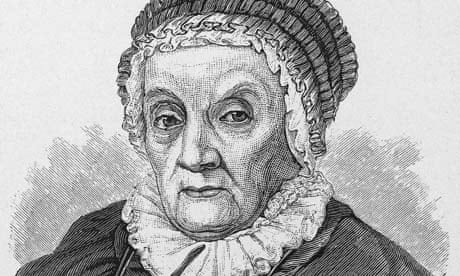One of the least expected successes in London's West End last week was Stella by the Take the Space theatre company. The three actors wore their own clothes, hadn't learned any lines, and there were only about 20 people in the invited audience who met in a circular room high above the Aldwych.
Moreover, the show was hardly a barrel of laughs, being about female astronomers – notably the tiny, forgotten, angry 18th century Caroline Herschel. But I have to admit, the audience choked on the bared emotions and the wonderment of people seeing deep space for the first time.
This was a performed, one-off reading of Stella, a new play by Irish actor-playwright Siobhán Nicholas, who appears to be inventing a new theatre form that we might call "revelatory early science". After their show about 18th century Royal Society chair and diarist Samuel Pepys, she and Chris Barnes – a former National Theatre actor and Barnum and Bailey circus clown – have been touring a play about "England's Leonardo": Robert Hooke.
By going back to early sources dug out of the Royal Society archives and elsewhere, Nicholas fleshed out the life of the natural philosopher and inventor, detailing the injustices he faced at the hands of the British scientific establishment, his rivalry with the grim Isaac Newton, and his friendship with Christopher Wren. The show was acclaimed at festivals and theatres around Britain and, fittingly, finally played at the Royal Society, where Hooke was curator of experiments for 20 years.
Stella is different. It explores the fevered world of women astronomers, especially the 18th century brother and sister relationship of Caroline and William Hershel. William discovered Uranus and its two moons and conducted the first systematic search of the heavens. Caroline – nominally his assistant – not only made his tea and telescopes, but discovered eight comets and 11 nebulae and won the Royal Astronomical Society's Gold Medal. Between them, they could be said to have laid the foundations of modern astronomy - a point made with Nicholas's parallel story of a modern woman astronomer.
But while the history books are full of William's achievements, William's thoughts and William's point of view, they are remarkably silent on Caroline's life work, referring to her "meek devotion" to him and, grudgingly, to her role as his assistant.
Nicholas went directly to her journals and found not just the mystery of eight missing pages, but a remarkable, rueful, humorous woman who came to Britain and, in just a few years, mastered a new language, learned mathematics, became a professional soprano singer, and ended up a far more rigorous cataloguer and arguably a greater discoverer of the cosmos than her brother.
Early European science is brilliantly funny, intellectually revolutionary and intensely passionate. But this is a part of the scientific and historical cosmos that is barely recognised and even less explored. Hopefully, someone will now commission this work and we will all get the chance to see it in full costume and with all the bells and whistles of a major theatre. I can think of nowhere better for it to start than at the Royal Observatory, Greenwich.

Comments (…)
Sign in or create your Guardian account to join the discussion